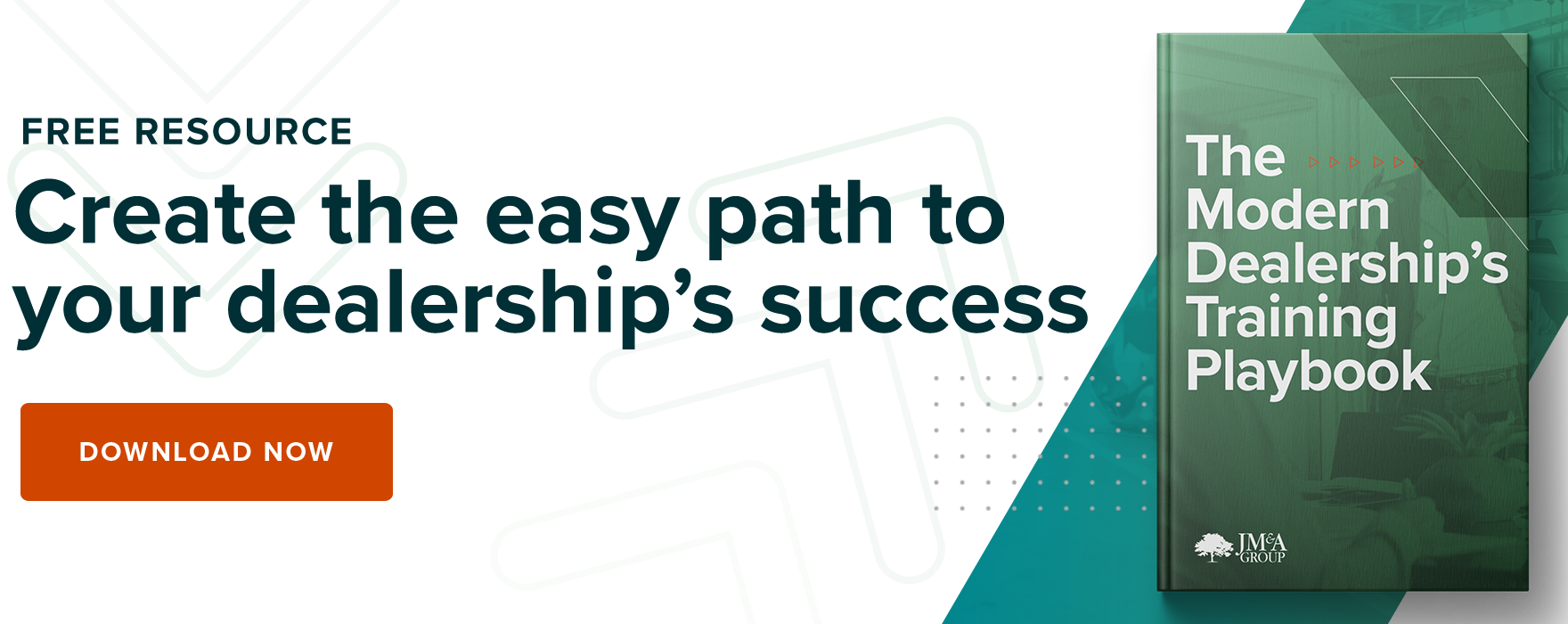The Importance of an Effective and Adaptable Training Program
By Amanda Pliskow | Updated: August 15, 2023
While it pays to hire employees for your auto dealership who bring valuable experience and soft skills, there's no way to find all the necessary competencies through the talent search alone.
You'll have to invest in training programs that enable your team members to reach their full potential. This means identifying the wide variety of abilities that go into an ideal dealership employee and finding ways to prepare every person on staff to handle their daily responsibilities more effectively.

Training is Needed to Deal with Change
Training requirements and best practices have shifted over the past few years because norms in the auto sales sector aren't standing still.
The increasing penetration of technology - both in customers' hands and on the dealership floor - has brought rapid change. Couple the digital retail evolution with the new priorities and preferences of millennial and Generation Z consumers, you're dealing with a very different environment than the one that existed in the 1990s, or even the first years of the new millennium.
Failure to reflect changing tastes could result in disappointing experiences for your dealership's customers. Research from McKinsey & Company noted that when compared to fast-moving and tech-driven industries such as apartment sharing and digital retail, the car-buying process is often slow and inconvenient. Your employees can and should be ready to improve the public-facing profile of your dealership, but without the proper training, they may not know how.
McKinsey reported that both in-person training events and digital employee education tools have a role to play in delivering next-level customer experiences.
These processes should be based on a new behavioral framework and prepare workers to deal with audiences through more tech-enabled channels than they previously used. Service team members are especially pivotal in these efforts, because as the researchers pointed out, consumers spend far more time dealing with repairs and upkeep than they do initially inspecting and buying their cars.
Formal Training Programs Should Cross Mediums
So how do you train your employees?
Today, you have plenty of options - and you should probably select more than one.
Learning styles differ between employees in any industry, and the dealership space is no different. If your focus is solely on in-person sessions, you may miss an opportunity to train workers who miss the meetings, and individuals who learn best independently may not get much out of the program. The same is true of exclusively running digital sessions: In-person reinforcement can deepen the value of modern, self-guided e-learning tools.
Of course, when your training program is so diversified, you also have to oversee the multiple channels of information carefully to ensure each employee is receiving a consistent message about the way the dealership should run. From onboarding sessions to ongoing skill refreshers and training aimed at specific teams, everything should add up to a single vision of excellence and performance.
Training As a Motivator and Retention Tool
Employee education has value beyond its basic ability to impart new skills. Workers who lack opportunities to learn - and the career advancement opportunities implied by the option for additional professional development - may become less motivated and engaged in their work.
CBT News offered a reminder that succession planning and leadership training among rank-and-file staff members may play an important role in keeping your team members committed to your dealership, showing them there are viable paths to greater responsibilities.
CBT added that you should understand the kinds of things that employees want to learn more about, and make optional training available to fill these skill gaps. If your program is comprehensive, it will include lessons on day-to-day departmental tasks as well as leadership-specific abilities that employees will have to hone to advance within the company.
Upskilling and Cross-Training Can Deliver Better Performance
Sometimes, the abilities you need to deliver high-quality customer service and overall employee excellence are already present in your workforce.
Longer-tenured team members may possess the product knowledge and polished presentation that new hires lack, while young workers can deliver a natural facility with tech tools and communication methods that millennials use and value. Even further, sales professionals can hold information that would make processes easier in financing or service... if only those other personnel could communicate with their colleagues.
Connecting professionals from various backgrounds and encouraging an exchange of ideas through upskilling sessions is one way to make your employees more well-rounded and capable of handling complex customer requirements and requests, while pairing up workers across departments via cross-training and shadowing ensures your departments understand one another - and develop a greater knowledge of customers.
Finding Value in Upskilling
Upskilling allows your employees to each add their individual abilities to the team's collective knowledge.
These are places where team members with a good grasp of social media strategy, either through their education or simple experience using these platforms and networks, can take responsibility for spreading this expertise to the whole team.
Older workers, baby boomers and members of Generation X among them, may have spent years performing a task that is still more common in auto retail than virtually any other kind of sales - making a face-to-face product pitch. Letting these workers take the training lead for such skills helps your customer experience as a whole.
Delivering Connectivity through Cross-Training and Shadowing
Remember this:
A dealership is at its best when employees in every department know what is going on in the other sections of the company.
This high level of transparency allows all workers to be more open and helpful when dealing with customer questions or requests. Making an upsell may depend on maintaining a close connection between financing, sales, service or one of a number of teams. Shadowing sessions or cross-training assignments, in which employees learn from their colleagues in other roles and departments, is a way to make knowledge less siloed and more accessible.
Better Communication Is a Worthy Goal
Creating a culture of learning and improvement within your dealership staff is one form of improving workplace communications. With employees learning from one another - and doing so from formalized training programs - silos between departments and teams will become less restrictive.
The ideal end result of such a transformation is a team of workers across functions and roles ready to serve your customer base better than ever before.





